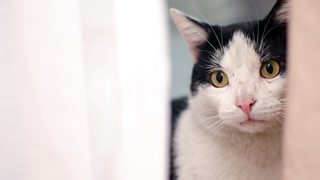How to prepare pets for your return to work
An expert's tips for preventing loneliness in pets.
The chance to spend more time with beloved family pets has been one major benefit of being confined to home over the last few months. They have been on the receiving end of more walks, head scratches, treats and tummy rubs than they've previously been used to.
But as restrictions ease and we drift back to workplaces our furry and feathered friends will once again be left home alone. How can we prepare them for a return to the quiet life?

Get out of the house
Clinical animal behaviourist, Elaine Henley, believes we must act immediately in order to prevent pet disorders occurring. Speaking on Mornings she said that she is already seeing an increase in animals with disorders related to separation.

She advised, "Look at the routine that you had before lockdown and try to re-establish that now before you have to leave them alone to go back to work."
Elaine suggested that making small changes now will help when you eventually leave the house for a full day’s work.
For example, she said: “If you’ve got to make a work call [do it in] your car. Sit outside, make that call.
“Go out a little bit more frequently even if it’s just for half an hour.
"It’s about trying to get back to normality and easing all of our pets – our dogs, our cats, our parrots – into what life will be again."
Doing this will be "less stressful over all,".
Tell-tale signs
According to Elaine, certain signs can reveal whether a pet is distressed.
An unhappy cat may be be more aggressive than usual and this behaviour could also include inappropriate urination. An unhappy dog may lose its appetite, whine, and display unusually disruptive behaviour. Meanwhile, parrots will be noisier and may show aggression towards their caregivers.
Stay in touch
Over the last few months we've been used to making video calls for work and keeping in touch with family and friends, but Elaine suggested they can also be useful for keeping tabs on pets.
"It's an easy way of seeing what’s happening when you’re not there," she said.
If it seems that pets are showing signs of distress it may be time to seek help from an animal behaviourist, And, as Elaine noted, it's worth checking details of pet insurance as it may cover fees if help from a professional animal behaviourist is required.
On ����ý Sounds
-
![]()
Mornings
Stephen Jardine asks, would you be happy with any relaxation of lockdown measures at the moment? And, how to look after lonely pets as we return to work.
Latest features from ����ý Scotland
-
![]()
'Wild swimming helps me process the grief of losing my son'
The benefits of cold water therapy.
-
![]()
Winter adventures are appealing, but an expert advises caution
Trips in winter require particular knowledge and skills.
-
![]()
The rescuers: Why volunteers risk their lives in mountain emergencies
Landward meets members of the Cairngorm Mountain Rescue Team.
-
![]()
‘Look for the light’ – practical tips to help you through another winter with SAD
Useful advice and tips to combat low moods at this time of year.
-
![]()
How you could be a binge drinker without even knowing
Binge drinking is classed as fewer units than many people may realise.
-
![]()
How chocolate biscuits and drama classes helped one man leave prison behind
The healing power of creativity.
-
![]()
'When people believe in you, it’s life-changing'
Author Graeme Armstrong revisits the man who helped turn his life around.
-
![]()
The 'breath-taking' display of US birds swept on to British soil
Recent storms have brought rare birds to our shores.
-
![]()
Six things we learned about Alan Cumming on Take the Floor (Spoiler: includes accordions)
The actor spoke to Take the Floor's Gary Innes.
-
![]()
How street gangs trap young men in a dangerous cycle of violence
The almost inescapable pull of life in a gang.
-
![]()
Why stylist Gok Wan believes there's no such thing as bad fashion
The fashion expert says we should stop following rules and do what feels right.
-
![]()
Is sending a CV still the right way to apply for a job?
They've been central to job applications for years, but are they worth it?
















